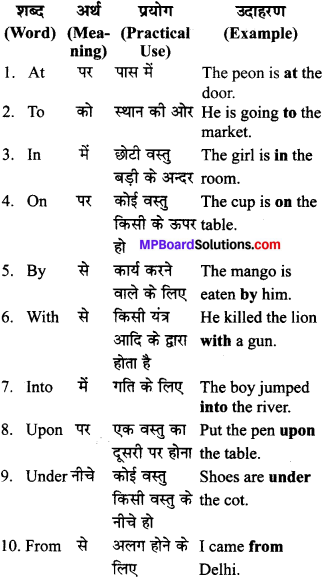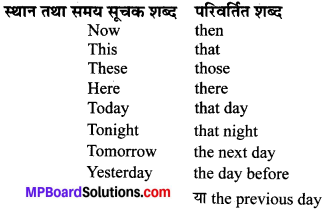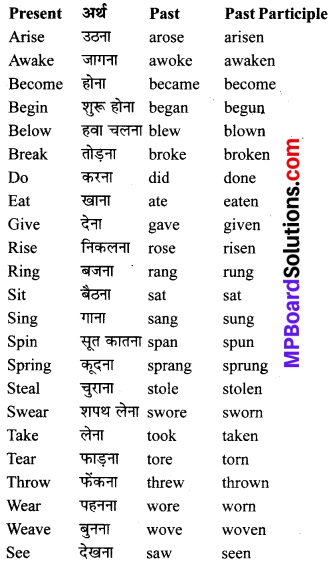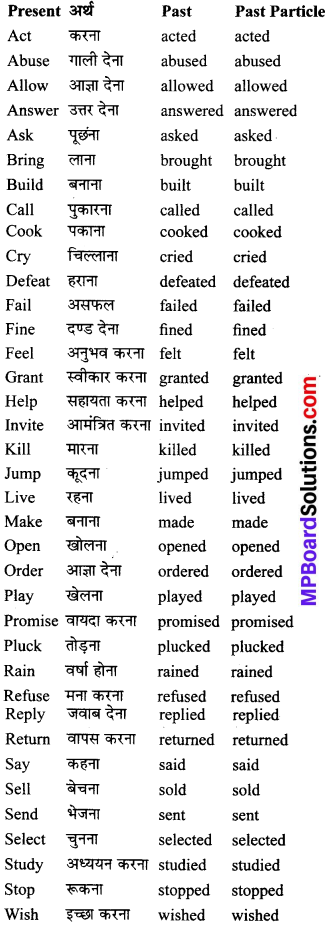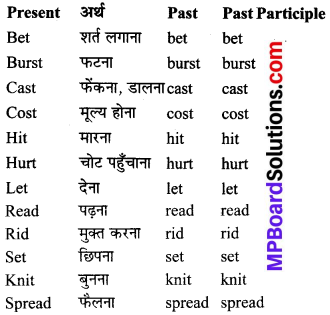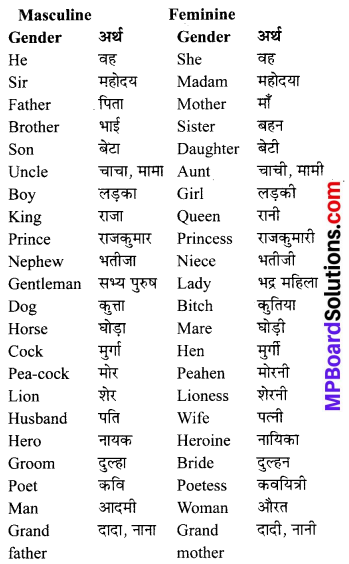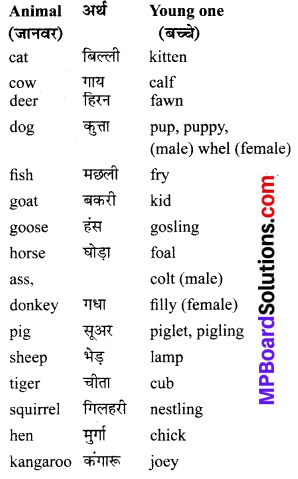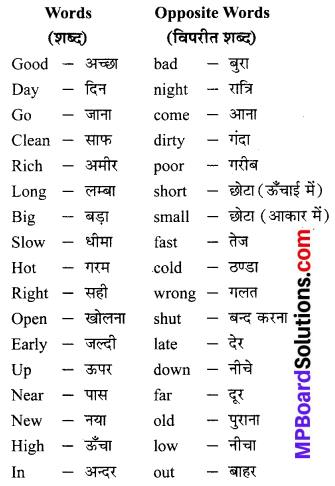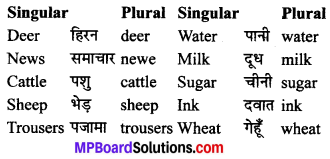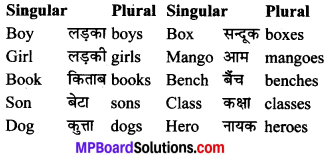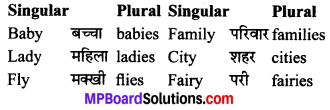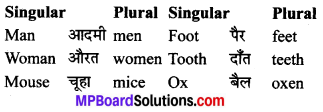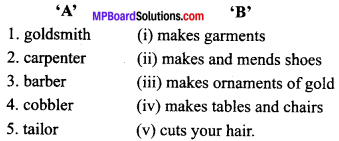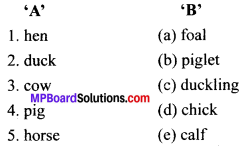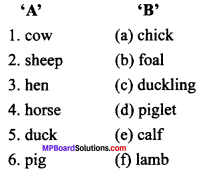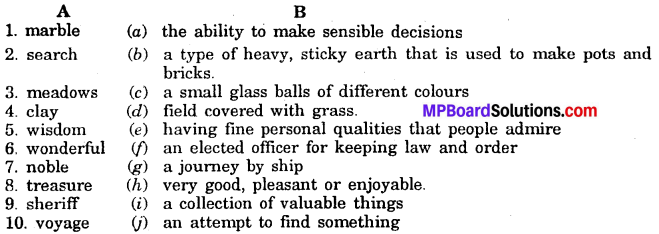Students who wish to prepare the English Subject can rely on the MP Board Solutions for Class 6 English Essay Writing Questions and Answers prevailing. Become perfect with the concepts of Class 6 English Essay Writing Questions and Answers, Essay Writing, Summary, Notes, Guide, Pdf, by preparing you can score highest grade in your exams. Here, You Can Download MP Board Class 6 English Solutions. Detailed Solutions are provided to the concepts by experts keeping in mind the latest edition textbooks and syllabus.
MP Board Class 6th General English Essay Writing
Ace up your preparation by referring to the Madhya Pradesh State Board Solutions for Class 6 Essay Writing Questions and Answers and learn all the topics within. Click on the topic you want to prepare from the Class 6 English and prepare it easily. You can understand your strengths and weaknesses by learining the Questions and Answers in MP Board Solutions for Class 6 English PDF.
The Cow (द काउ)
गाय
- The cow is a pet animal.
- She is four footed animal.
- She has two eyes and two horns.
- She has a long tail and two big ears.
- She eats grass, leaves, corn and hay.
- She gives us milk.
- She gives us calves.
- Her calves are used for agriculture.
- Curd, butter and ghee is made from her milk.
- Hindus worship the cow.
- We call her ‘Gau Mata’.
Meanings of Difficult Words (कठिन शब्दों के अर्थ) :
Pet (पैट) = पालतू, animal (एनिमल) = जानवर, four footed (फोर फुटेड) = चौपाया, eyes (आइज़) = आँखें, horns (हॉर्स) = सींग, long (लौंग) = लम्बा, tail (टेल) = पूँछ, big (बिग) = बड़ा, ears (ईयर्स) = कान, eat (ईट) = खाना, grass (ग्रास) = घास, leaves (लीव्ज़) = पत्तियाँ, corn (कॉर्न) = अनाज, hay (हे) = भूसा, give (गिव) = देना, milk (मिल्क) = दूध, calves (काव्ज़) = बछड़े, used (यूज्ड) = प्रयोग किया जाता है, agriculture (एग्रीकल्चर) = कृषि, curd (कर्ड) = दही, butter (बटर) = मक्खन, ghee (घी) = घी, Hindu (हिन्दू) = हिन्दू, worship (वर्शिप) = पूजा करते हैं, Gau Mata (गऊ माता) = गऊ माता।
The Dog (द डॉग)
कुत्ता
- The dog is a pet animal.
- It is found all over the world.
- It is found in many colors such as black, white, brown and black and white.
- It has four legs, a tail, two eyes and two ears.
- Its has sharp teeth also.
- It eats bread, milk and meat.
- It watches its master’s house.
- It barks when its sees a stranger.
- The dog is a good friend of man.
- It is very useful and faithful animal.
Meanings of Difficult Words (कठिन शब्दों के अर्थ) :
Found (फउण्ड) = पाया जाता है, world (वर्ल्ड) = विश्व, संसार, many (मैनी) = बहुत, colors (कलर्स) = रंगों, black (ब्लैक) = काला, white (व्हाइट) = सफेद, brown (ब्राउन) = कत्थई, black and white (ब्लैक एण्ड ह्वाइट) = चितकबरा, sharp (शार्प) = तेज, bread (ब्रेड) = रोटी, meat (मीट) = माँस, watch (वॉच) = रखवाली करना, master (मास्टर) = मालिक, house (हाउस) = घर, bark (बार्क) = भौंकना, when (व्हेन) = जब, see (सी) = देखना, stranger (स्ट्रेन्जर) = अजनबी, friend (फ्रेण्ड) = मित्र, useful (यूज़फुल) = उपयोगी, faithful (फेथफुल) = स्वामी भक्त।
My School (माई स्कूल)
मेरा स्कूल
- I read in Sarafa School, Lashkar.
- Mr. P.C. Dubey is my Head Master.
- There are five hundred students in my school.
- There are nine teachers in my school.
- All teachers are very hard working.
- My school has a beautiful building.
- There are nine rooms and an office.
- There is a big playground also.
- There is a big library in my school.
- The result of my school is always very good.
- like my school very much.
Meanings of Difficult Words (कठिन शब्दों के अर्थ) :
Head Master (हैड मास्टर) = प्रधान अध्यापक, five hundred (फाइव हण्ड्रेड) = पाँच सौ, hard working (हार्ड वर्किंग) = कठिन परिश्रमी, beautiful (ब्युटीफुल) = सुन्दर, building (बिल्डिंग) = भवन, rooms (रूम्स) = कमरे, office (ऑफिस) = कार्यालय, playground (प्ले-ग्राउण्ड) = खेल का मैदान, big (बिग) = बड़ी, library (लायब्रेरी) = पुस्तकालय, result (रिज़ल्ट) = परिणाम, always (ऑलवेज़) = हमेशा, like (लाइक) = पसन्द करना।
The Postman (द पोस्टमैन)
डाकिया
- The Postman is a government servant.
- He wears khaki uniform.
- He goes door to door.
- He has a leather bag on his shoulder.
- He delivers letters and money-orders.
- We all wait for him every day.
- His duty is very hard.
- But his pay is very low.
- We should be kind to him.
- He must be paid well.
Meanings of Difficult Words (कठिन शब्दों के अर्थ) :
Government (गवर्नमेण्ट) = सरकारी, servant (सर्वेण्ट) = नौकर, wears (वेअर्स) = पहनता है, khaki (खाकी) = खाकी, uniform (यूनीफॉर्म) = वर्दी, door (डोर) = द्वार, leather (लैदर) = चमड़ा, bag बैग = थैला, shoulder (शोल्डर) = कन्धा, delivers (डेलीवर्स) = बाँटता है, letter (लैटर) = पत्र, moneyorder (मनी-ऑडर्र) = धनादेश, wait (वेट) = इन्तजार, every day (एवरी डे) = रोजाना, duty (ड्यूटी) = कर्त्तव्य, hard (हार्ड) = कठिन, but (बट) = किन्तु, pay (पे) = वेतन, low (लो) = कम, नीचा, kind (काइण्ड) = दयालु, well (वैल) = अच्छा
My Daily Life (माई डेली लाइफ)
मेरी दिनचर्या
- I get up at 5 O’clock in the morning.
- After attending to nature call I go for a walk.
- I return and take breakfast.
- I study from 7 a.m. to 9 a.m.
- Then I take bath and lunch and go to school.
- I study at school from 10.30 a.m. to 4:30 p.m.
- I return home and have tea at 5 p.m.
- I play games for an hour, then I study for three hours and take dinner at 9:00 p.m.
- I watch television for an hour.
- I go to bed at 10 p.m.
- On Sundays I watch films and serials on T.V. and help my parents in domestic work.
Meanings of Difficult Words (कठिन शब्दों के अर्थ) :
Nature call (नेचर कॉल) = नित्य कर्म, breakfast (ब्रेकफॉस्ट) = सुबह का नाश्ता, lunch (लन्च) = दोपहर का नाश्ता, dinner (डिनर) = रात का भोजन, study (स्टडी) = अध्ययन करना, domestic (डोमेस्टिक) = घरेलू, serials (सीरियल्स) = धारावाहिक।
My Best Friend (माई बेस्ट फ्रेण्ड)
मेरा प्रिय मित्र
- I have several friends but Ram is my best friend.
- He is my neighbour and also my classmate.
- He always stands first in the class.
- But he is not proud.
- He always helps his classmates.
- His father is a businessman and his mother is a teacher.
- We go to school together and study at home together.
- He is good at sports and games too.
- He faces problems boldly.
- I like him for his qualities and good nature.
Meanings of Difficult Words (कठिन शब्दों के अर्थ) :
Several (सेवरल) = अनेक, neighbour (नेबर) = पड़ोसी, classmate (क्लासमेट), = सहपाठी, proud (प्राउड) = घमण्ड, businessman (बिजेनेसमैन) = व्यापारी, face (फेस) = सामना करना, boldly (बोल्डली) = हिम्मत से, qualities (क्वालिटीज़) = अच्छाइयाँ, nature (नेचर) = व्यवहार।
Hope the data shared has shed some light on you regarding the MP Board Solutions of Class 6 English Essay Writing Questions and Answers. Do leave us your queries via the comment section and we will guide you at the earliest with help seeked. Stay connected with our website and avail the latest information in a matter of seconds.
